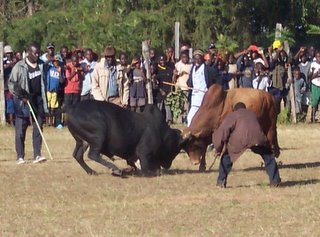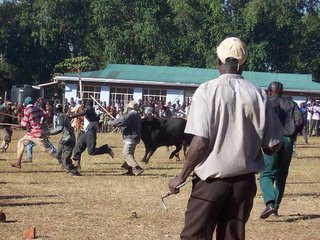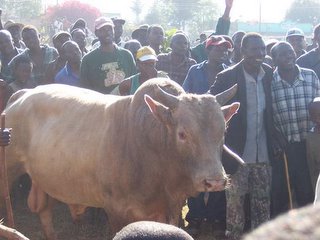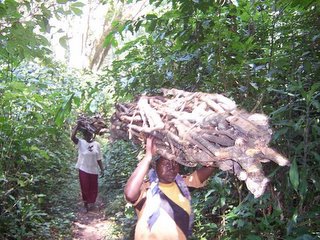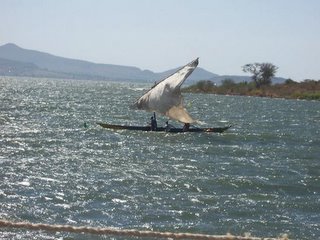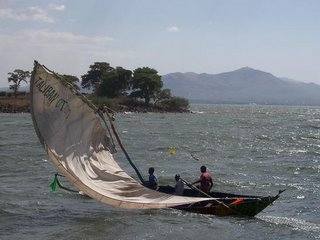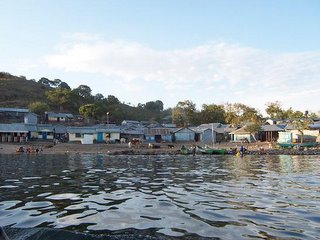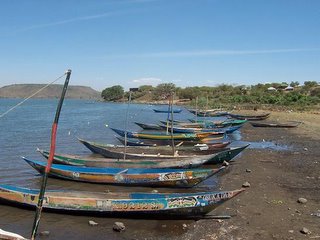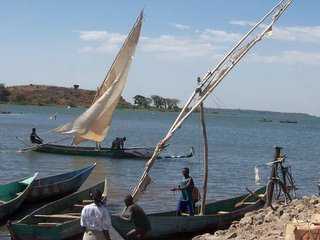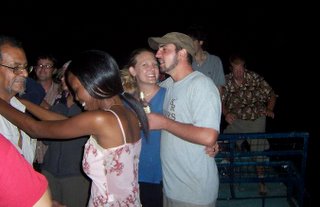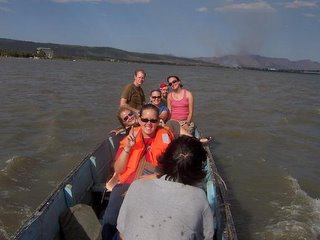So this weekend was quite an adventure. I was extended an invite to Mfangano Island from a few volunteer friends, and since it is in the Lake Victoria/Nyanza province, I assumed that the Island was very close to Kisumu. Valuable lesson of the day: buy a Kenyan map and study it thoroughly; Lake Victoria is BIG. More on that in a minute.
Since I was relatively caught up on things work-related except for some books on crops and grant proposals that I brought with me, I left Friday at 6 in the morning under the assumption that I could spend quite a bit of time in Kisumu checking for packages and letters that are supposedly in the PC office there. I haven't received anything from home since November and was looking forward to stocking up on any delayed Christmas presents that may have come my way. I also wanted to get additional material from the PC library concerning grant applications and maybe grab lunch at the Muslim-owned restaurant in town with fantastic fish biriani. I thought that my friends would show up sometime later, we could make a quick trip out to the island, and I would have plenty of time to get things done in Kisumu as well.
Here's where the fun and my usual luck with traveling adventure comes in. It turns out my friends had left Eldoret at some ridiculously early hour and made it to Kisumu at 7am. I had finished a bike ride and only made it as far as the matatu to Kakamega at that time. I received at least seven text message stating "where are you now?" followed by more urgent messages such as "get to the Kisumu matatu stage ASAP". Apparently there was a bit of a miscommunication problem concerning when I needed to be in Kisumu. As a result I made it there about ten minutes late for the last bus that could reach the town with a ferry station (called Luanda Kotieno) in time for the 11:00 ferry to Mbita. After much deliberation I was greeted by a tout (the guy that takes money and recruits people to board their matatu) who stated that his bus would get me to Luanda Kotieno in time to catch the ferry, no problem. Since I really had no idea exactly how long the trip was, but knew there was still more than two hours remaining before the ferry left, I decided to take my chances. Second valuable lesson of the day: Never trust a matatu Tout.
The trip to Luanda Kotieno took four bumpy, dusty, hot, cramped hours...not to mention I had a touch of nausea. Nearly the entire trip consisted of a single lane dirt service road, and right beside it sat a neatly constructed and level two-lane road that has apparently been under construction since the dawn of time. When I finally got to the pier at almost 1:00, the 11:00 ferry had of course left. However, I had already put seven hours into the trip and was not about to turn around. Luckily I met a fisherman named Patrick on the bus and he was extremely helpful and friendly. He informed me that there was a 3:00 ferry to Mbita and that I could even make it to Mfangano that same day. I sent a text message to my friends - who managed to take an express bus that only took two hours which got them to the pier in more than enough time - and told them I was on my way. They replied that they would be waiting for me...the last I would hear from them for the day.
So anyway, while waiting for the three o'clock ferry Patrick gave me a guided tour of the town and discussed his life as a fisherman. He was very friendly and outgoing and wants me to come visit him in his village sometime soon. While waiting I watched the fisherman in their colorful small wooden boats with tattered, homemade sails going out to the lake to catch fish. Sometimes the wind would blow so hard that the tip of the sail would touch the water, and the guys on the boat would hang to the side in hopes of not falling out. Patrick tells me these boats capsize regularly and the fishermen are skilled at flipping them back around, although at the expense of any fish they may have caught. I have some of the best pics I have taken thus far to post once I get them off my camera.
I also watched a variety of birds swimming on the lake or flying by overhead, and saw several hawk-looking things swoop down and pull fish from the water. Meanwhile, Patrick informed me which birds tasted good and which were not the best for eating. Along the shore of the lake were huge nets that had been laid out to dry, and they were covered with mountains of small fish called omeno, which are an inexpensive source of protein. There was also a boat laying on its side with several goats standing inside to keep out of the sun.
So the 3:00 ferry came and touts lined up to greet people as they left the boat by grabbing their luggage and herding them into buses. Once they cleared past us I piled onto the ferry to go across the first stretch of water to Mbita. Everyone was crammed next to each other on the few benches in the the boat, while there was a huge, breezy outdoors area where cars were parked. I don’t understand why Kenyans prefer to be smushed together and I stood outside and was treated to an absolutely breathtaking view of the surrounding lakeside mountains and islands. Lake Victoria is gigantic (in fact, we drove alongside it for several hours before reaching the pier) and there were almost ocean sized waves that the ferry had to crash through on the way to Mbita.
Once on Mbita Patrick walked with me to yet another boat to get to Mfangano Island. This boat was considerably smaller than the ferry, pretty much a slightly larger version of the wooden boat I took through Lake Victoria over New Years, and as expected it was absolutely crammed full of people. There is no pier to board the boat, so entrance requires wading through snail-infested waters up to your waist, as the other fifty people that were already on the boat had done. There was a guy on the side of the shore charging 20 shillings to avoid this, and he gave me a piggy back ride through the water to the edge of the boat. I was laughed at by the Kenyans but didn't care, it was worth a quarter to not be soaked in schisto water from the waste down.
So finally, after a bike ride, two matatu rides, a bus ride, a ferry, and a small boat I was on my way to Mfangano. On the way I realized I could very well be on the most beautiful place on earth, and as we passed a resort island that costs thousands of dollars and is only accessible by private plane, I had to laugh that my trip to the island from Kakamega cost about $5.
By now it was 6 in the evening and I called my friends to excitedly tell them I had made it at last, but alas, there was no answer. The phones went straight to a message telling me they could not be reached, and I assumed they had managed to find a spot on the island where there was no cell phone coverage. I was discouraged, but the hospitality of the people in that area was overwhelming. On the boat to Mfangano, after already receiving plenty of assistance from my new Kenyan friend Patrick, I met about six other Kenyans who gave me their phone numbers and welcomed me to visit them on the island. When I told my story to one of them who happened to be the brother of one of the chiefs on the island, he made a phone call and had the chief waiting for me when I arrived. The chief introduced me to his son Collins, who is about to finish secondary school and wants to go to college in the States. Collins was a big help and after a quick meal of chapatti and beans he took me to a small guest house that smelled like it was used for cleaning fish. For 200 shillings I had a place to stay for the night, and after joining Collins for a Tusker I called it a night in a relatively good mood considering I never did find anyone I was supposed to meet.
The next morning there was still no answer from my friends, but Mfangano is basically a mountain island with a peak that has a spectacular view. With all my gear on my shoulders I checked out of my smelly fish hut and started the trek on the path up the hill. Even though I could not find anyone, I assumed that perhaps they would want to climb the mountain as well and I would eventually meet them at the peak. Very early in the morning on the way up the mountain, I came across a farmer and his son who had taken the trek down even earlier to pick up some dried fish from the village. The farmer explained that the highlands of Mfangano are full of farmers, almost all of them his relatives, and he has 10 brothers with plots nearby. Everyday he climbs up and down the mountain with produce from his shamba (garden), and the trek is strenuous to say the least. As I was growing winded and nowhere near the top, he continued to skip along like only someone who has climbed the same path thousands of times could do. He encouraged me to walk with him because, as it turned out, there were many forks on the trail and I would not have made it to the peak without someone to help.
As we reached the peak the farmer showed me what he referred to as the shrine, which is an area at the very peak of the mountain where no trees have been cleared for gardens and many of the farmer's ancestors are buried. The shrine predates the introduction of Christianity to the island and around the pile of rocks that makes the highest point are the remains of broken pottery, some of it hundreds of years old, where in a previous time sacrifices had been made for the ancestors. According to the farmer the shrine was where crop and animal sacrifices occurred until recently, when Christianity took hold on the island. Now at the top of the pile of rocks is a wooden crucifix, and the farmers seem to have created a hybrid religion combining the principals of Christianity with the ancestor worship of the traditional African religions. Also, there is a place that was once a watering hole on the top of the mountain. Due to a devastating drought that Kenya is experiencing right now the well has run dry, but the farmer told me at one time you could put a branch or something distinctive in the water at the top of the mountain, and there is a place at the base of the island where you can see it washing out to sea the next day.
After exploring the shrine, which really did fell like a spiritual place, I visited one of the farmer’s brother's houses, and he had a view that was absolutely phenomenal. Any of the land on this island would go for millions of dollars in the states, and here there are farmers in thatched mud huts getting by on less that a dollar a day. Although I was reluctant to take anything from him, the brother gave me a few mangos from his shamba that tasted like one would expect a paradise fruit on a paradise island to taste. After a brief conversation in Swahili with the brother I went with the farmer to his house and was welcomed in. This farmer also lived in a mud hut with a paradise view. The lake is so big that even thousands of feet in the air you can still look out across the water and not see the other side. Apparently on some days you can see a dim outline of Uganda, but there was a haze in the air from the heat and all I could see was water. The farmer’s furnishings consisted of a small wooden table and three wooden chairs, two of which were broken. The hut was partitioned into three rooms and thin foam mattresses were spread on the floors of the other two rooms where the farmer, his wife, and his five children sleep. The farmer’s wife wanted to speak with me but she only understood the langage of the Luo tribe, as well as one other language, called Suba, that was traditionally spoken on the island before Luo became predominant. Some of the oldest Wazee (elders) on the island speak only Suba, which is why it is understood by others on the island, but once they are gone it is likely the language will go with them, and another piece of history will be lost. I think that’s fascinating. Here is a link on it: http://en.wikipedia.org/wiki/Suba_language
So the farmer, who had almost nothing, gave me bananas and mangos that grew on this shamba. When I tried to refuse he explained that getting them down the mountain was such a hassle that most of them will rot on the ground anyway. So I stuffed myself with fruit and then was offered ugali and eggs. I’ve learned that it is sometime futile to turn down food here so I ate that as well and went on my way. I gave the farmer my contact info and hope that perhaps he can coordinate a Farmer Field School on his island so that trainers will come from Nairobi to assist them.
So I headed down the mountain and still had not seen my friends. I pretty much gave up since their phones were still out of range and went down to the shore, where I was able to hop on a boat going back to Mbita. On the way they were stopping at the resort island for a drink and I agreed to go with them. Then, as soon as the boat was on the water and leaving Mfangano I got a call from Collins, stating that my friends had shown up looking for me. Frustrated, I got off at the resort Island, treated the guys to cold sodas for the assistance, and started looking for a way back to Mfangano again. I found some fishermen going that way and hitched a ride, and thought I was home free until their boat broke down about 200 yards from Mfangano. I sat there and drifted for awhile until I managed to reach Collins, who came out in a boat and towed us back to the island. At last I caught up with the people I had wanted to see in the first place.
As it turns out, I did not miss much. They did not go to the peak that day and instead, on the other side of the island, paid 200 shillings a person to see “ancient cave paintings” that they decided looked like they had been painted about 10 years ago. Furthermore, they stayed at the house of some very conservative Christians, and since one of my friends was their with her boyfriend, they were treated to a lecture on immorality.
That night we met up with the district officer of the island, once again thanks to Collins, and he let us sleep on his compound. We squished 5 people in a four person tent and all slept terribly.
So perhaps all in all things worked out for the best. I know this posting was huge but it was more for my sake to remember everything than anything else. It took 12 hours to return home, and what could have been an uneventful weekend at my compound makes for a pretty good story now. T

